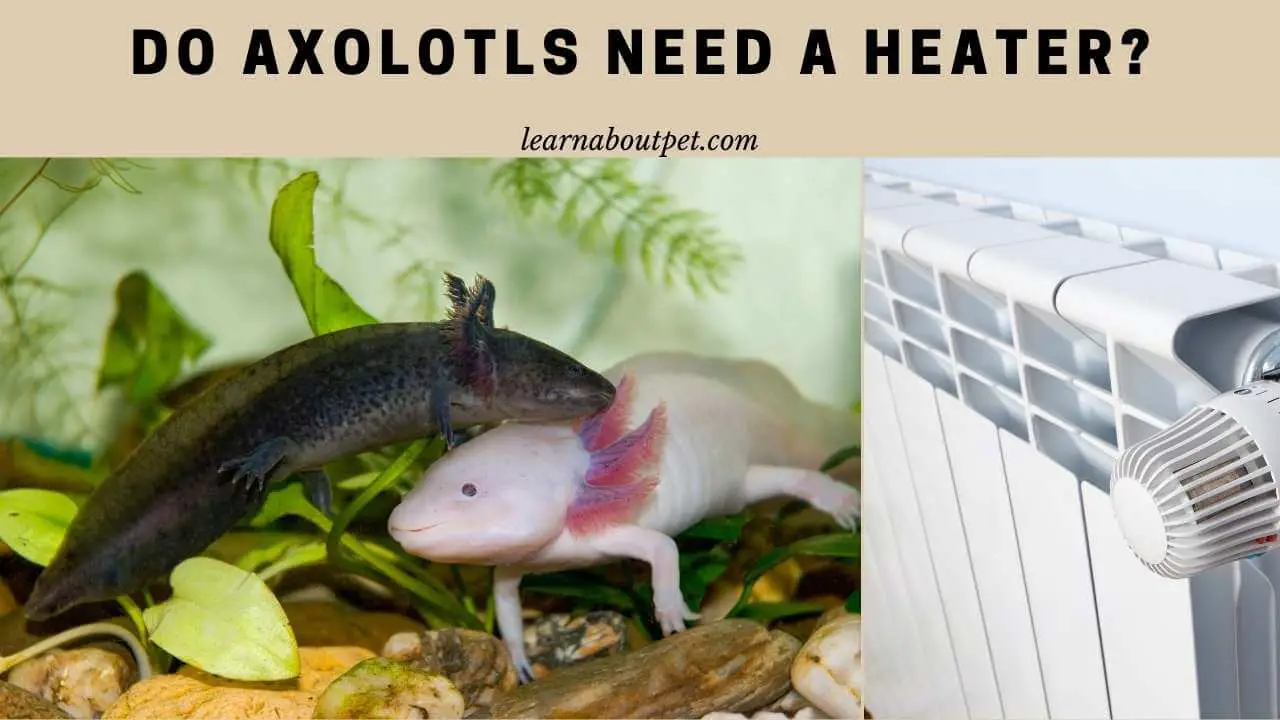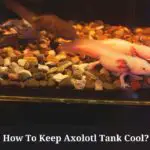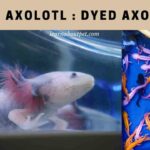We all know how the chilly cold weather can affect us as human beings. This is also the case when it comes to our pets with some of them needing a heater to bring in the much needed warmth. What about axolotls, do axolotls some kind of water heater installed in their tank to see them through the cold weather?
Do axolotls need a heater? No, there is no need for a heater in an axolotl’s tank. Furthermore, in warmer climates you might be required to add a chiller in your tank to keep the water temperature within the recommended range for your axolotl. The recommended range for axolotls is between 60-64 degrees Fahrenheit, or 16-18 degrees Celsius.

For pet owners out there who want to know whether or not a heater is a requirement for their axolotls during the cold season, and for those who are thinking of keeping an axolotl as a pet soon, let’s look at this subject matter and other affiliated questions that may arise.
What Do Axolotls Need In Their Tank?
Axolotls are best suited for an aquatic environment. Furthermore, the conducive water temperature required for your axolotl is between 14 and 19 degrees Celsius.
Anything above this will cause your axolotl stress and can lead to infections and anorexia. Also, the water should not push your axolotl around in its tank.
If high water temperatures can affect your axolotl negatively what about when it comes to cold weather, do axolotls need a heater in the cold season? No, your axolotl doesn’t need a heater added to its tank.
On the contrary, in warmer climates you might be required to add a chiller in your axolotl’s tank to keep the water temperature within the recommended range for your axolotl. The ideal range for axolotls is between 60-64 degrees Fahrenheit, or 16-18 degrees Celsius.
How Cold Is Too Cold For Axolotls?
In case you were wondering, your axolotl cannot survive at the surface even when the temperature falls to freezing point. This may be surprising, but is due to the fact that axolotls don’t feel cold like humans do since humans are endothermic and axolotls aren’t.
This means that humans have to generate their own heat and they have to keep close to 99 degrees Fahrenheit in order to survive. When we consider this, do axolotls need heaters in their tanks?
Not necessary. It is unlikely that the water in your axolotl’s tank will ever drop to freezing point, so there is no need to fit a heater to your axolotls tanks.
On the contrary, a chiller is required to regulate water temperature during hot weather.
Do Axolotls Need Heat?
No, your axolotl doesn’t need any form of added heat, more so for the places the temperature is warm enough. Although your axolotl can adapt to different temperatures, it is advisable to keep the water in your axolotl’s tank within the recommended temperatures.
Furthermore, always remember to keep your axolotl’s tank away from direct sunlight.
Do Axolotls Need A Heater?
No, your axolotl doesn’t require a heater in its tank. However, in much warmer weather, you may be required to install a chiller to your axolotl’s tank to keep the water temperature in your axolotl’s tank within the recommended range, that is between 60-64 degrees Fahrenheit, or 16-18 degrees Celsius.
What Temperature Should Axolotls Live In?
The ideal temperature for your axolotl’s environment is 16-18 degrees Celsius. This temperature should never go beyond 24 degrees Celsius as this would be harmful to your axolotl.
Can Axolotls Live In Room Temperature?
Room temperature in most cases ranges between 20-24 degrees Celsius, or 68-72 degrees Fahrenheit. This is definitely too high for your axolotl.
Your axolotl requires temperatures of 16-18 degree Celsius, or 60-64 degree Fahrenheit. You can achieve this temperature either by adding a chiller to your axolotl’s tank or by positioning your axolotl’s tank to a cooler room.
What about when it comes to axolotls in a very cold environment, do axolotls need a heater in this kind of environment? No, an axolotl is naturally wired to live in a cold aquatic environment.
A cold environment is therefore less likely to ever have a negative effect on your axolotl’s health as compared to a warm environment.
How To Keep Axolotl Water Tank Temperature Cool?
You can do this by floating a bag of cold water or ice in your axolotl’s tank to gently lower the temperature of the water. Be careful however not to lower the water temperature more than 2 or 3 degrees Fahrenheit within 4 hours.
Furthermore, only put ice cubes in your axolotl’s aquarium directly if you made them by reverse osmosis or using DE chlorinated water. When we talk about making your axolotl’s tank cool, what about making it warm, do axolotls need a heater added to their tanks in cold weather?
No, your axolotl in some instances may require a chiller to bring down the water temperature in its tank but it never need a heater to raise the water temperature in it’s tank.
Do Axolotls Die At High Temperatures?
Yes, wrong water temperatures can cause your axolotl to die. Temperatures of between 16-18 degrees Celsius, or 60-64 degrees Fahrenheit, are ideal for your axolotl.
However, your axolotl can tolerate a slightly higher or lower temperature.
If your axolotl can tolerate a slightly higher temperature than normal, do axolotls need a heater added to their tanks when higher temperatures are required? No, in most cases even if higher temperatures are required for your axolotl, you can simply achieve this by repositioning your axolotl’s tank to a warmer part of the house since if ever any extra heat is needed, it will be very minimal.
How To Care For Axolotls Without A Heater?
In warmer than usual climates, you can add a chiller to your axolotl’s tank to lower the temperatures accordingly. If you can’t afford a chiller you can lower the water in your axolotl’s tank by floating a bag of cold water or ice on the water in the tank.
However, when adding ice cubes in your axolotl’s tank only add ice cubes made by reverse osmosis or by using DE chlorinated water. That said, the cold temperatures experienced by axolotls rarely affect it negatively as it is hard for the temperature to fall to the point of being harmful to your axolotl.
Hot weather can on the other hand easily affect your axolotl if it is not regulated.
Requirements For Axolotl’s Water
You may be required to add a chiller to your axolotl’s tank during excessively warm weather to bring down the temperatures to the recommended range. The right temperature for your axolotl is between 60-64 degrees Fahrenheit or 16-18 degrees Celsius.
When it comes to the water pH, 7.4 to 7.6 is ideal. Chlorine from tap water is also potentially harmful to your axolotl therefore make sure you dechlorinate it before adding it to your axolotl’s tank..
You can do this using a dechlorinator. You can also let the water stand for 24 hours before putting it in your axolotl’s tank, that is if you don’t happen to have a dechlorinator.
What about during excessively cold weather, do axolotls need a heater? No, excessively cold weather will not affect your axolotl since it is an aquatic animal.
Your axolotl can only be affected by cold temperatures only if the water temperature in its tank is below freezing point, which is highly improbable. There is no need therefore to add a heater to your axolotl’s tank.
What Temperature Do Baby Axolotls Require?
The ideal temperature for a mature axolotl is 60-64 degree Celsius, or 16 to 18 degrees Celsius. Baby axolotls on the other hand require a slightly higher water temperature.
This is important as it increases their metabolism and assists them grow faster. Therefore, for baby axolotl, a temperature of between 18-20 degrees Celsius, or 64 to 68 degrees Fahrenheit is recommended.
Considering that a baby axolotl requires a slightly higher temperature for optimum growth, do axolotls need a heater therefore since a heater can provide the extra heat needed by a baby axolotl? The extra heat required by a baby axolotl is very minimal therefore it doesn’t require a heater.
You can make up for this heat just by simply repositioning your axolotl to a warmer part of the room.
Do Axolotls Have Feelings?
Not much evidence is available to show whether or not axolotls have feelings. Moreover, their senses are not the best in the world, and they will hardly even recognize their owner unless they pass through some form of training.
Do Axolotls Need An Air Pump?
Due to their fast growth rate, young axolotls require more oxygen. An air pump is therefore necessary at the initial stages of your axolotls life.
However, as axolotls mature, their metabolism decreases, reducing their air requirement. When fully matured they don’t need an air pump.
When it comes to our initial question, do axolotls need a heater, we can safely conclude that a mature axolotl doesn’t need a heater added on its tank, what about a young axolotl? A young axolotl still does not require a heater since it is by nature an aquatic animal that can live in relatively cold water even when young.
Furthermore, room temperature also often correlates with the ideal temperature needed for your axolotl therefore there is no need for a heater.

Are Axolotls Friendly To Humans?
Although axolotls aren’t unfriendly, it would be far-fetched to call them sociable. This is because axolotls are solitary animals that like keeping to themselves.
Despite having no interest in humans, they don’t even spend time with their kind unless they are mating.
What Temperature Should Axolotls Live In?
Keep your axolotl’s tank in a cool room away from bright sunlight. Keep the water temperature between 57 and 68 degrees Fahrenheit, or 14 and 20 degrees Celsius. It should never go above 75 degrees Fahrenheit, or 24 degrees Celsius.
Furthermore, unlike many reptiles, no special lighting is required for your axolotl.
When it comes to temperature, do axolotls need a heater to provide the needed temperature for an axolotl’s survival? No, axolotls don’t need a heater either in their young or adult life.
Do Axolotls Lay Eggs?
Female axolotls lay eggs 12 to 72 hours after intercourse. A single female axolotl can deliver up to 1,500 eggs in the aquarium decor.
However, remember that newly born axolotls will not feed immediately. So don’t get alarmed when you notice this.
Do Axolotls Need Light?
Axolotls have poor eyesight therefore they prefer dim light. They are also sensitive to light since they don’t have eyelids.
In case your axolotl’s tank is brightly lit because of the presence of live water plants, you should establish darker areas for your axolotls sake.
What Insects Can You Feed Axolotls?
Being predominantly carnivorous, axolotls eat a variety of insects such as crickets. Worms are also a good alternative away from insects.
You can pick from a wide variety of worms such as mealworms, butterworms, superworms or even bloodworms.
Final Verdict – Do Axolotls Need A Heater
In conclusion, what can we say about the topic, do axolotls need a heater? As we’ve seen above, axolotls don’t need a heater added to their tanks.

However, you may need to add a chiller to your axolotl’s tank in excessively warm weather so as to regulate the water temperature of your axolotl to the recommended range.
It is also important to ensure that the water Ph level in your axolotl tank is right.
Also make sure to use chlorine free water as tap water that has chlorine can be harmful to your axolotl.

Welcome to Learn About Pet. My name is Rajkumar Ravichandran and I love all pets, travel, and amazing food. I write about my passion and personal experience caring for multiple pets in this blog! ❤️
Post Disclaimer
DISCLAIMER: THIS BLOG OR WEBSITE, "Learn About Pet", DOES NOT PROVIDE YOU WITH MEDICAL ADVICE AND IS NOT A SUBSTITUTE FOR MEDICAL ADVICE. ALWAYS GET IN TOUCH WITH YOUR PERSONAL VETERINARIAN AND USE INFORMATION HERE AS GENERAL ADVICE.
The information, including but not limited to, text, graphics, images and other material contained on this website are for informational purposes only. No material on this site is intended to be a substitute for professional veterinary advice, food recommendation, diagnosis, or treatment. Always seek the advice of your veterinarian or other qualified health care provider with any questions you may have regarding a medical condition or for pet food related questions.







